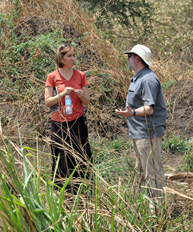This column was written for and ran on EpiscopalCafe.com on 21 April 2012.
We have a new addition in our household, a giant-pawed Great Dane puppy named Julian.
She came into our lives recently as a 10-week-old, gangly, runt-of-the-litter, Brindle-colored baby and immediately wriggled her way into our hearts and minds.
Watching her adjust to her new surroundings, with three new people and two new dogs (who are, as they constantly remind us, Not. Amused.) reminds me of missionaries and the adjustments they go through when they arrive in a new land.
Just as missionaries need to leave behind all whom they love to live with new people, whom hopefully they will come to love, Julian had to leave behind her sire and dam and three brothers, as well as the breeders.
Just as missionaries have to learn to live in new housing situations (sometimes mud huts, sometimes tents, sometimes very Western-style apartments), Julian has had to learn to live in our house, which is very different from the farm where she was bred and spent the first 10 weeks of her life.
Just as missionaries need to learn a new language, with all of its colloquialisms, Julian is learning her own new language: “Come. Out. Sit. Down. Off. No bite. Leave it. No. Good girl!” It is not easy for missionaries or puppies to untangle the nuances of new languages.
You go into a new place, and everything is new: the people; the food; the customs; the language. It doesn’t matter if you are a missionary or a puppy, there’s still a lot of learning going on, and every day is a day of discovery.
Her first night with us, Julian did what most every puppy does when it was time to go to bed: She cried. She sat in her crate, with blankets and toys, and whimpering and cried for a long, long, long time. Eventually, she slept, mainly because she was so very tired.
My first night as a missionary in Sudan? I cried as well. Even though I had worked like the dickens to get to Sudan, even though I really, really wanted to be there, I still cried. Everything was new and foreign and I was so very far from all that I knew and loved. Like Julian, I cried myself to sleep that night. (And did so again when I moved to Haiti, four years later.)
No matter how hard you try, as a new person in a new place, you make mistakes. You go to the wrong places, say the wrong things, do the wrong things at the wrong time. Anyone who has had a puppy knows that puppies do all that – and more – all the time. Missionaries and puppies are constantly learning, constantly striving, constantly attempting to please, to fit in, to not be seen as an “outsider” who doesn’t belong there.
Every day is a day of discovery and adventure, of new things to do, new people to meet. Every day also presents new opportunities to make mistakes, to get lost, to realize that what you “know” may only be what you thought you knew.
The more I watch this Great Dane puppy, the more I see my life as a missionary. Things that scared me at first, or that seemed too hard to do, became so normal that they stopped meriting a mention.
Julian grows at an astonishing rate. Where once she was the same size as the 10-year-old spaniels, she now towers over them. Where once she was confused and timid, she is now confident and bold. She still stumbles around a bit – she’s growing into her body, we like to say – but she stumbles a lot more boldly than when she first arrived. She knows she is loved and cared for, which gives her the confidence to go forth into the world, seeking new adventures, new friends, new challenges.
My life as a missionary was much the same. There was constant growth (not physically; I’d already grown into my body). I, too, was timid at first, and made lots of mistakes, not understanding what was happening to me or around me. But the longer I stayed, the more I learned, the bolder I became, and as I grew bolder, I was more willing to even more new things.
Yep, welcoming Julian into my life has made me realize: Missionaries could learn a lot from watching a puppy. Their lives are, more than I ever realized, so very similar.











